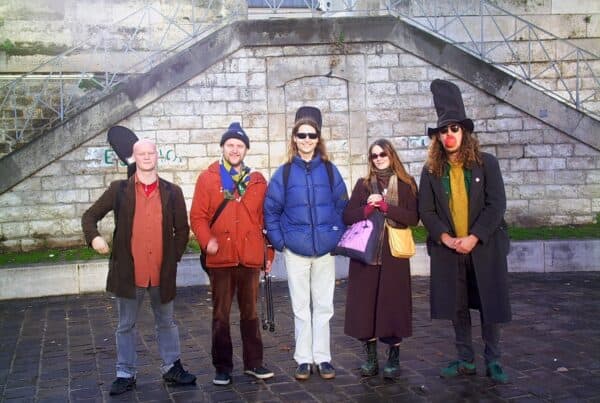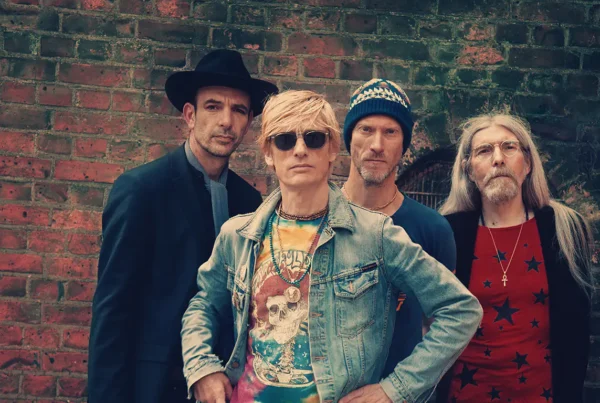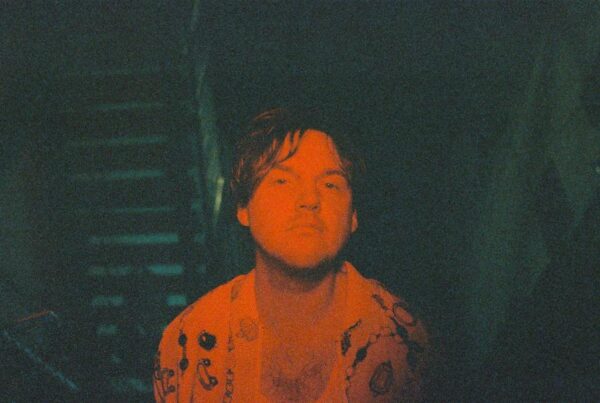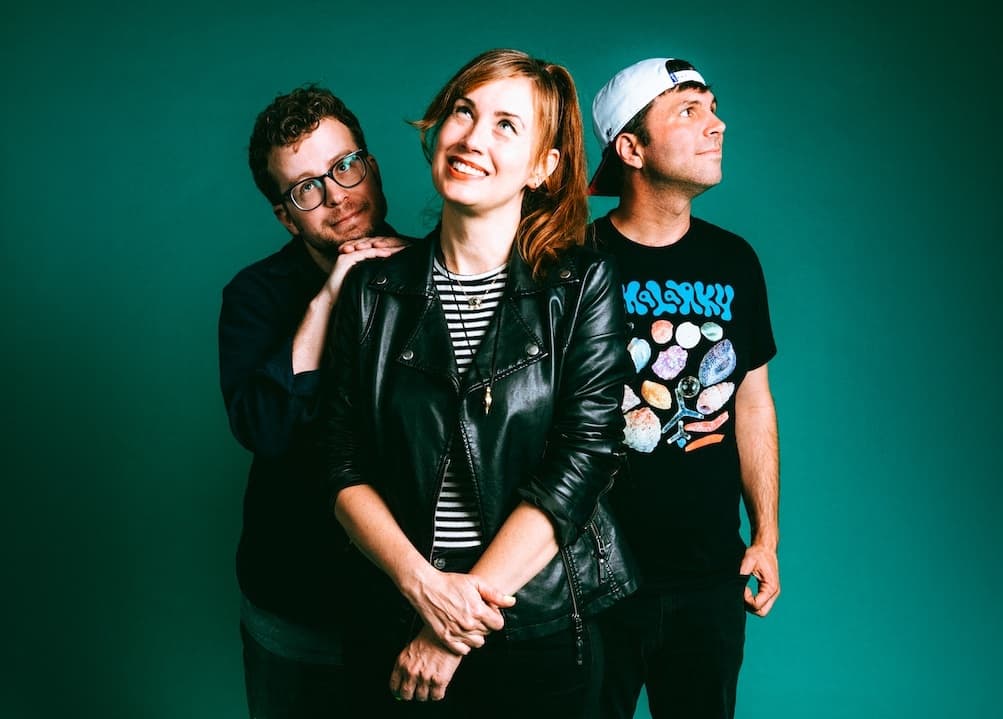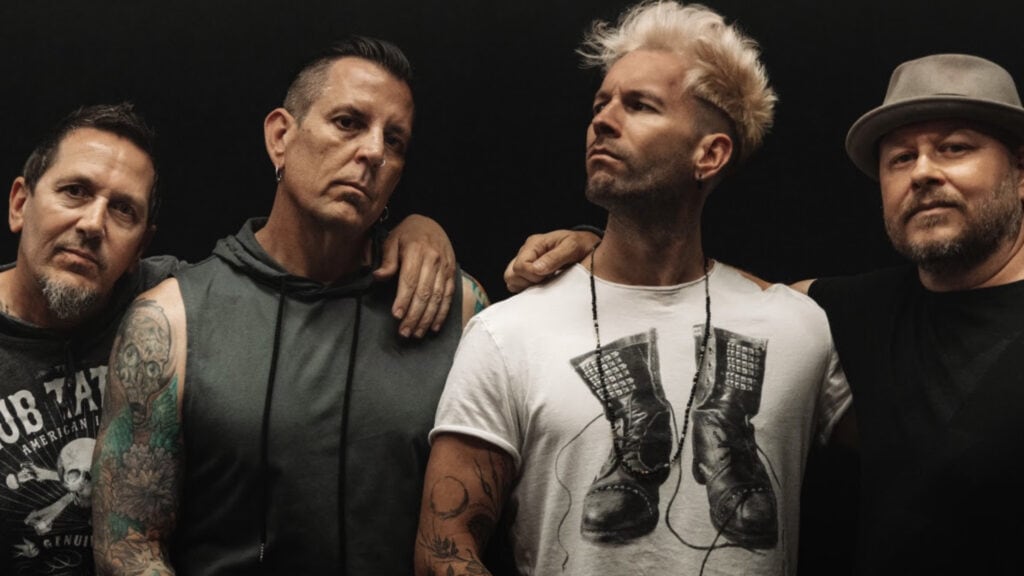“Thanks for waiting two years,” frontwoman Elizabeth Stokes of The Beths earnestly says to an adoring sold-out Brudenell Social Club on the 28th March. It had, indeed, been a long time coming. The New Zealand power pop quartet were riding a growing wave of buzz at the start of 2020, built off of their irresistible 2018 debut Future Me Hates Me and a tight as hell live show that saw them earn opening slots for bands like Death Cab for Cutie. Barely 18 months after releasing that debut, the band turned in the finished masters for their follow-up, Jump Rope Gazers… and then, well, you know what happened. Rather than hold the album back, The Beths diligently pressed on with their release plans and the more contemplative, somewhat slower follow-up became quite the balm for me during those dog days of enforced (both self- and not-) isolation. Their magnificent intricate harmonies became more integral to the songwriting, their command over instantly-memorable middle-eights got even stronger, and Stokes’ relatable anxiety-riddled lyricism cut even deeper when the distant emotional longing she sings about became the daily norm for people like me.
Evidently, I was not alone in that feeling. Despite having to reschedule their UK shows twice amid the ever-changing state of pandemic-life, that Leeds gig had one of the hottest crowds I’ve been a part of since live music made its regular return. For an album released in the middle of lockdown’s weird time-collapsing bubble, the songs from Jump Rope Gazers received an equal-to-even-more-rapturous response than long-standing fan favourites off of Future Me. Rather than stunting their momentum, like one may have expected for an indie band just getting their feet wet on the public stage, the pandemic instead seemed to have merely delayed its payoff for a little while, like the moment when a violently shaken soda can finally gets cracked open. Being from New Zealand – where COVID mandates and responses were stricter, implemented quicker, and ultimately more successful than in many other areas of the world – The Beths did manage to play some shows during 2020 and 2021 in their home nation, but they were still taken aback by just how strong the response ended up being on their tours so far this year.
They’ve also been busy. In September, 20 months after Jump Rope Gazers, they’ll drop album #3, Expert in a Dying Field. Lead single “Silence is Golden” is an outright ripper, a fuzz-toned buzzsaw barrelling along at 100MPH that intentionally rubs some grit on The Beths’ gleaming pop songwriting and will absolutely destroy all the live stages they pass through. Written to work best in a live setting, one could potentially read Expert as an unconscious reaction to the dropped average tempo of Jump Rope or perhaps as a cathartic blast of energy responding to the last two years. Gazers was released in isolation, but much of Expert was recorded in isolation following an unproductive 2020 and a national lockdown in mid-2021 that forced the band to sit with what they’d initially worked on and refine/expand from afar until they hit on something they were really proud of. Both Stokes and guitarist/producer Jonathan Pearce liken the process of making Expert in a Dying Field to getting to make their first album all over again, being given the time and space to create the best possible versions of these songs without so much pressure.
A week before the new album was officially unveiled – and after multiple delayed attempts to arrange something thanks to a particularly chaotic UK leg of their ongoing world tour – I got the chance to hop on a Zoom call with Stokes and Pearce to go over the last two years. How they adapted to releasing an album in the early pandemic days, fostering a community via their Patreon, the madness of trying to tour nowadays, their evolution in songwriting on Expert in a Dying Field, and Stokes’ supernatural ability to pull perfect counter-harmonies out of thin air.
This interview has been lightly edited for length and clarity.
Let’s wheel back to 2020, the Before Times. Pandemic kicks in right as you’re starting up promo for Jump Rope Gazers. How did it affect you in preparing to put that album out? To know that you had all these dates locked in only to suddenly have everything thrown into uncertainty?
Elizabeth Stokes: Well, it was kinda interesting because you plan these things out so far in advance. We handed in the album on March 6th, but it didn’t hit New Zealand til the week after. That was the week SXSW got cancelled. I do remember despairing, cos you’re just trying to absorb any information that you think will be helpful. You’re reading articles where people are saying “it’s gonna be four years” and you’re like “oh, GOD!” I mean, they’re basically right.
Jonathan Pearce: I didn’t believe any of it then, though. I thought a year. Smart people were saying “three years, four years, two years…”
Liz: Hopeful people in the music industry were saying “…six weeks!” *laughs*
Jon: And so we just kept postponing things. There was a second where we kinda knew it was going to be a big deal and we could’ve stopped, just said “let’s hold onto the record,” and I really feel for artists who did make that decision. I feel like we had a much easier time of it through that first period of the pandemic because we had something to focus on. We decided to put the album out anyway, we were learning how to reach people on the Internet better, we were taking part in the livestreaming micro-phenomenon that happened for a brief second. I think it would’ve been pretty despairing if I decided to just sit there and wait.
Liz: If you had all that momentum ready to go, which we did, it did come to a screeching halt. But at least we still had something to focus on. We still had a timeline for the year. We had three singles from the album: April, May, June, July. By July, we were actually able to play a show in New Zealand. The border was tightly shut but there was no COVID in the community and so we actually did a full album release tour at the end of 2020. With the clarity now of a couple of years, having gone on the road, it’s nice to hear people say that the album really helped people during that stage of the pandemic. They would say at the time “ugh, it sucks that you had to release during lockdown but you’re doing something to make people happy!” And we’d be like, “no, it’s not! It sucks! We’re doing nothing!”
Jon: “I went for a jog today!”
Liz: “I played Animal Crossing for eight hours and then watched a video about how to make graphics for a livestream!” It didn’t feel like releasing the album had done anything until, two years later, we actually got to play it for people who actually say it to your face. “Oh, I believe it now!”
Did you find that Bandcamp Fridays and your Patreon helped with promotional work during that early onset of the pandemic?
Liz: Yeah, sure. Every little thing which came up was helping with the passage of time when it felt like everything had stopped. Being “oh, there’s a Bandcamp Friday coming up, maybe we can make something for it?”
Jon: And the Patreon’s turned into a way to communicate with people while we were making the album. It’s not something I’ve ever done before. We normally wouldn’t have done a Patreon and we ask for so little money that it isn’t really about the money. It was just difficult to connect with people for so long and we were looking for new and better ways to do that. You make a better connection than if you were screaming at people on social media or something.
Liz: It’s not even really that we’re good at the connection part of it. But when it’s social media, it feels like you’re advertising pretty consistently. As opposed to Patreon where you don’t really have to advertise cos “hey, we’re here cos we wanna be!”
How was it to get back on the road and tour an album that’s two years old at that point? Cos tours are often used to promo an album but you were already working on a new one you couldn’t show yet. Was it kinda weird to reverse yourself back two years?
Liz: It wasn’t weird in that way. That aspect of the touring was actually really nice. It was like “ah, this is coming back and this feels great!” Touring right now… the range of emotion is so large. And the best part is just playing the shows, playing those songs.
I remember you saying on stage that the vinyl didn’t show up initially. Did it ever turn up?
Liz: I forgot about that!
Jon: A month later! We eventually got it!
Liz: Not the American one…
Jon: No, we did eventually. That stop got sent to Manchester and we packed it up for those rescheduled shows.
Liz: Oh, yeah!
Jon: So, the vinyl we eventually got was from a completely different stop!
Liz: This has happened to us more than twice! It happened on our American tour as well!
Jon: It’s really hard to move around the globe at the moment. Moving a vinyl record, moving a band, moving instruments… There was a band this weekend that came overseas for a show, lost their guitars on the way over. It’s happening to everybody! Moving stuff is no fun.
I heard one of you got COVID?
Liz: At least. *laughs* Jon got COVID right towards the end of the dates we had already rescheduled once, and we really didn’t want to cancel these shows cos we couldn’t reschedule them again, so we played as a trio. It’s almost hilarious cos it feels like everything to do with touring… It’s just crisis control right now. You arrive and “OK, we’ve made it here but there’s no merch.” And a lot of border crossings are difficult cos of gear passports in the UK and EU. Then there was the P&O Ferries union busting thing was whilst we were there…
Jon: That was a potential nightmare. We managed to avoid it, just.
Liz: That’s what I mean by the range of experiences. Even through all of that, it feels worth it to be able to play shows.
Jon: Definitely. You’re rewriting the playbook. The old one’s been thrown out and everything’s new and different, and causes panic throughout the whole affair.
Do you think some of that is because a lot of industries are trying to go back to how things were rather than trying to work with how things are? Like they hit a point where they decided, “OK, pandemic’s over now!” and aren’t really adapting to the changes its wrought?
Liz: Yeah, I’d kinda say so. When we were in the States, everybody was still wearing masks and there were still mandates. Then we hit the UK, all the mandates were lifted. It was hard to find tests. You were kind of on your own if you’re trying not to catch COVID which… We ARE trying not to catch COVID and presumably there are people in the audience trying not to catch COVID. But it’s difficult not to.
You started working on Expert in a Dying Field in 2021. How did things change when approaching songs compared to Jump Rope Gazers or Future Me Hates Me?
Liz: Quite a bit from the first two records. Future Me I wrote over a long time when we were living together in Auckland and had regular day jobs and stuff, then tracked it over a really long time at Jonathan’s studio. Jump Rope Gazers was a really concentrated amount of time where I knew I had to write a new record. I wish I’d had a bit more time? It was just really concentrated to get it written and recorded which is the classic Second Album thing, right? This one… I had time, but I hardly wrote anything in 2020. There were a few things from that time which made it onto the album, though. “When You Know You Know” I reckon was 2020; elements of “Change in the Weather.”
Jon: “Expert in a Dying Field” was a reasonably early one as well.
Liz: By June I was, “OK, this album is written.” But by July I was, “I don’t know if I like this album very much, I don’t think it’s good enough.” Then we had a bit of extra time cos there was a huge nationwide lockdown which lasted 4 months and I could write a bit more. It’s almost a luxury I wished I’d had with all previous projects, to get a point where you can’t really progress it for a few months. So, we sat with it, tweaked it, wrote a few more songs…
Jon: It feels more like writing a first album. I think you dug deeper in a way that you were able to on the first record. Cos when you make a first record, you got all the space in the world! You don’t know what you’re doing yet, so you can try stuff.
Liz: So, we tried some stuff.
Jon: We tried to do a magic trick of making it sound like we were doing more with doing less. I don’t wanna say “minimal” cos that’s such a loaded word and I think a bullshit word. I’m a maximalist, really. We imagined ourselves playing the songs as we were writing them, like on the first album to be played in a pub somewhere.
So, minimal in scope rather than a drum machine…
Jon: Minimal is a genre now, right?
Liz: We’re not that.
Jon: And this album is not that!
You wrote it to be taken in live. Was some of that also a conscious change from Jump Rope which was a bit more mid-tempo record? “We tried some of that, now let’s do something a little faster.”
Liz: Maybe everything in life is an overcorrection of what you’ve done previously. *laughs* It’s so strange, when you go from one album to two albums, you double your number of songs! It really dilutes the pool! Our catalogue was like 12 songs previously and so the average tempo just dropped. And there were faster songs on Jump Rope, but there were also some slower songs…
Jon: Like, four or five slower songs.
Liz: There was a broader range of sounds. With a second album, now a third of your songs sound quite different and that feels strange. Then you have to play them live, some of them also hard! *laughs* We wrote some songs that are easier to play live. Not “easy” easy, but easier to translate. But this album as well also has the fastest song in our catalogue and the slowest song in our catalogue, so it feels like we’re stretching in both directions. We’re figuring out what we like to do.
Jon: That’s been an interesting thing to learn from the second album as well. I think a lot of people have said “oh, The Beths are a slow band now,” as if it would affect the feeling of seeing a live gig. But what we learned from the last tour was that a lot of the high points came off Jump Rope Gazers and one of the highest points of the show, 50 shows in a row, came from playing the title song; the slowest song in the set. When we were first confronting ourselves with what we had made, we were a bit nervous and unsure. It must have had some lasting effect to wait that long to test it out on tour and hearing some real feedback. Those nerves we had on the second album about what we’d done were very real, but I feel like they’ve faded away now.
One of the things I always love about your songs are the way you do harmonies and middle-eights and bridges. How do you arrange those when putting the songs together?
Liz: Some are baked in right at the start when I make the demos. But others, for instance with “Out of Sight,” the harmonies at the end came later on in the arrangement. It feels like pop music writing, which I love everything about the craft of writing a song! You take a motif from earlier in the song and recontextualise it later.
Jon: I dunno where you come up with them cos you come up with them in secret! The demos Liz does are an electric guitar jammed straight into the computer, no drums, no bass, sometimes a little bit of lead guitar… Then a completely fleshed out and fully arranged backing vocal arrangement!
Liz: *laughs*
Jon: You just get into a flow state, the times when I’ve seen you do it. You get that thousand-yard stare and you’re not looking at anything. You’re looking through the microphone and the computer and just in your head-zone singing a bloody melody and it’s the bloody perfect melody!
Liz: Backing vocal melodies are fun cos the main vocal melody is tied to the lyric and they’re so inextricably linked. But with the backing vocal, it’s nice that it doesn’t have to be a lyric. It’s like the hard part is done, the words, and you can just come up with a melody that balances what else is going on or fits around it.
Jon: See, that’s crazy to me cos it suggests you have at least two or three really good melodies for every song and you happen to have chosen one just based on the words.
Your description makes it sound like in her stares she just sees through all of time and picks the perfect melody out of thin air!
Jon: The amount of times this has come up, man! We’ve been in band practice and said “oh, this bit needs a counter-melody here” and I’m thinking to myself, “OK, I’ll go away, I’ll write some stuff in my bedroom over a few hours and bring it back to the next band practice.” And then right there on the spot, before I’ve even finished my sentence, Liz just sings the perfect line and ends up playing it on guitar or bass, then that’s it. Job done. No bedroom noodling was required.
Like in The Matrix where they ring up, “Tank, I need a harmony!” And BOOP there it is!
Jon: *laughs* That’s exactly it!
Liz: You make it sound so easy!
Jon: I could be exaggerating a little bit, but the amount of times this has happened! It’s enough to be a thing.
What are you guys currently listening to? Outside of your own album for finishing touches, obviously.
Jon: This is a question that can definitely mess up a musician. So often, what you’re listening to you’re listening for a specific reason and you’re a little embarrassed. The thing I’ve been listening to a lot recently was Lucy Dacus’ Home Video and “Kissing Lessons.” We just saw her play twice here in New Zealand, so that’s really big in my mind at the moment. She’s such an open book with her lyrics, she’s amazing.
Liz: My two favourite albums lately have been a local artist called Reb Fountain, she released an album called IRIS. Then I’ve gotten really into The Gobetweens which I hadn’t listened to before. They’re an Australian band, so treacherous, but 16 Lovers Lane? Really like that record.
From what I understand about Australia/New Zealand relations, you need to keep that on the down-low.
Liz: *laughs* Yeah!
Jon: The funny thing about The Gobetweens is that they are the only Australian band that is ever name-checked by New Zealand bands! Of that classic era, 80s and 90s, New Zealand had the whole Flying Nun Records thing going on. If you asked Martin Phillipps of The Chills what he was listening to, he’d be like “The Bats, Jean-Paul Sartre Experience, and The Gobetweens!” There would be no other Australian band! There is an overlap there that feels less treacherous…”
Liz: They’re like the most New Zealand-y Australian band.
Jon: *laughs* That is probably some sort of sacrilege in Australia, but it’ll keep the streets safe in New Zealand!
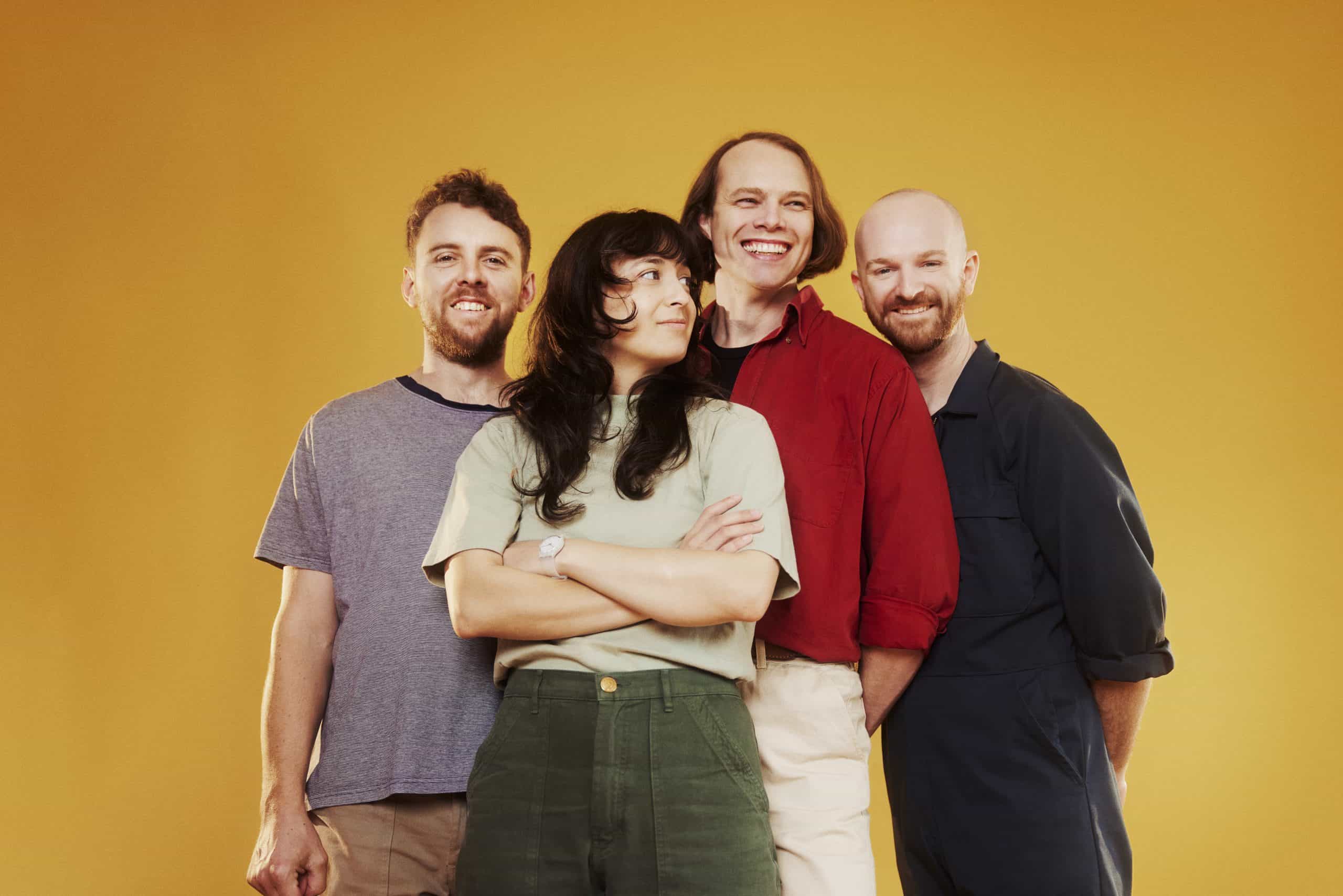
Photo by Frances Carter.
Expert in a Dying Field releases on 16th September 2022 via Carpark Records.
Words: Callie Petch.

